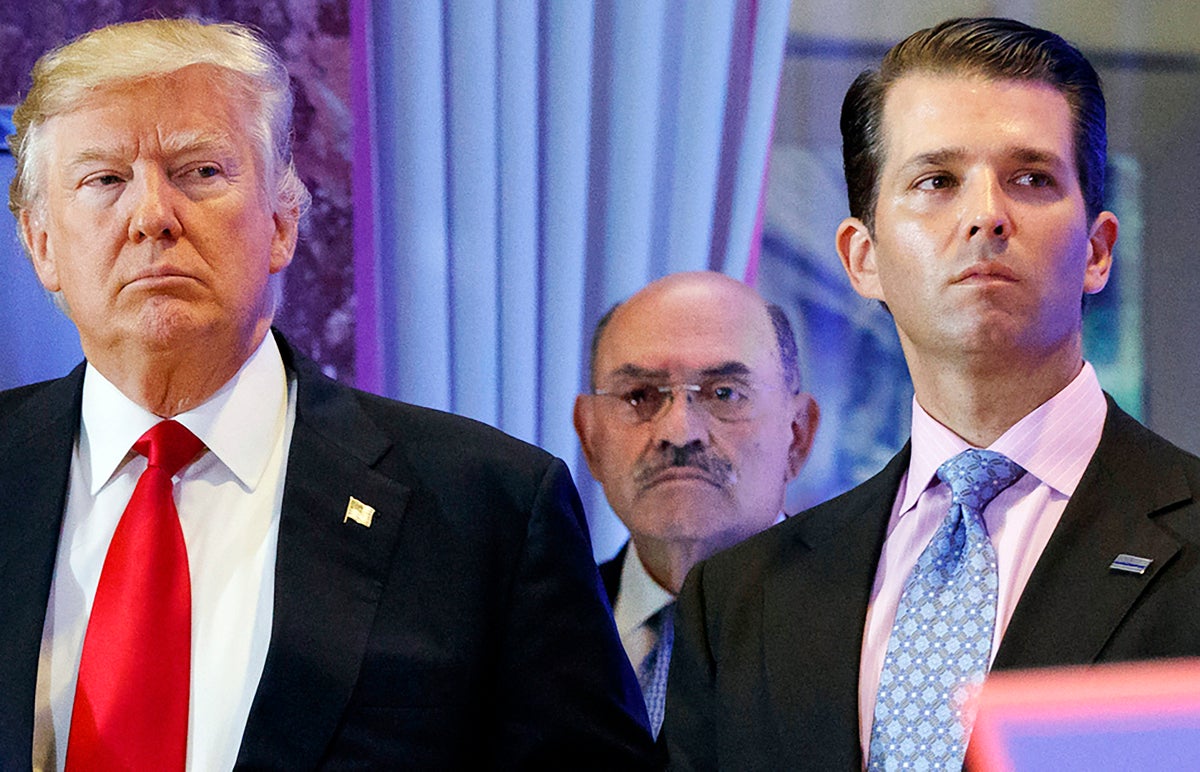
Allen Weisselberg, the former chief financial officer at Donald Trump's company, got out of jail Wednesday but might not have freed himself from the legal morass surrounding the former president.
The 75-year-old emerged from New York City's Rikers Island jail complex facing the same pressures he was under three months ago, when he started serving time for tax evasion.
The Manhattan district attorney could potentially want Weisselberg as a witness in its historic criminal case against Trump, which involves a scheme to suppress negative stories about the Republican during his 2016 presidential campaign.
Some people close to Weisselberg have advised him to do what it takes to spare himself more legal peril.
The Trump family, meanwhile, may have an interest in keeping Weisselberg loyal. The Trump Organization is making severance payments to Weisselberg and paying his legal bills.
The former executive's recent decision to switch lawyers, away from the attorneys who represented him in the tax case, has prompted speculation he might be drawing closer to the famous family that employed him for nearly 50 years.
The company has, so far, supported Weisselberg, calling him a victim of a “never ending witch-hunt." The lawyer who represented Weisselberg during the trial, Nicholas Gravante, said after his former client's release from jail Wednesday that “anyone who truly knows Allen feels sorry that he had to go through this.”
“I hope he can now retire in peace, spend time with his wonderful family, and leave the circus in the rear view mirror,” Gravante said.
With his intimate knowledge of the Trump Organization’s financial dealings, Weisselberg would be a valuable witness in Trump's criminal case.
The former president is accused of directing underlings to falsify company business records to disguise payments made to his former lawyer, Michael Cohen, as reimbursement and reward for his work buying the silence of people with stories about Trump's alleged marital infidelity.
In court filings, prosecutors said Weisselberg advised Cohen how to pay off two women who said they had sexual encounters with Trump, and later arranged for Cohen to be paid $420,000 for that work in 12 installments.
Trump has pleaded not guilty, saying the charges are politically motivated. Trump also says he didn't have affairs with the women.
Weisselberg was not charged in the case.
If prosecutors want Weisselberg's testimony, they could try could issuing him a subpoena, but they would run the risk of his asserting his Fifth Amendment protection against self-incrimination.
Prosecutors could also try pressuring him through the threat of criminal charges and a promise of immunity or leniency if he testifies truthfully.
That's what happened last year, when the Manhattan district attorney prosecuted both Weisselberg and the Trump Organization — but not Trump himself — over the company's practice of giving executives untaxed job perks.
Weisselberg pleaded guilty last August to failing to pay taxes on $1.7 million in off-the-books compensation, including a Manhattan apartment, Mercedes-Benz cars for him and his wife, and his grandchildren’s school tuition.
Under his plea deal, Weisselberg was required to testify at the Trump Organization's trial. He did so carefully, laying out the facts of his own involvement in evading taxes but taking care not to implicate Trump, saying his boss was unaware of the scheme.
Weisselberg was guaranteed a five-month sentence, which he began serving in January. He was eligible for release after three months.
During the grand jury investigation that led to Trump’s indictment, prosecutors approached Weisselberg’s legal team about the possibility of charging Weisselberg with more crimes. Weisselberg is already a defendant in fraud lawsuit brought by New York's attorney general that says he was part of a company scheme to inflate the value of its assets in finance statements.
Around the same time, according to two people familiar with the matter, the Trump Organization asked Weisselberg to switch lawyers.
Trump’s son, Eric Trump, who runs the Trump Organization’s day-to-day operations, told Weisselberg to dump Gravante after people close to Trump decided his zealous representation of Weisselberg could end up harming the ex president, the people told The Associated Press. Weisselberg was told that if he didn’t switch lawyers, he could get stuck paying his own legal bills, according to the people, who were not authorized to speak publicly about sensitive legal matters and did so on condition of anonymity.
A Trump Organization lawyer denied that company pressured Weisselberg to change lawyers.
“It appears that someone is trying to feed the public a false narrative because they are unhappy that Weisselberg switched lawyers,” said the company lawyer, Susan Necheles, who is also representing Trump in his criminal case. “The truth is, Mr. Weisselberg’s decision to change lawyers was entirely his own.”
Necheles praised Gravante and called him “even handed.”
Another lawyer involved in Weisselberg’s case who was paid by the Trump Organization, Mary Mulligan, also no longer represents him.
Weisselberg’s new lawyer, Seth Rosenberg, is a former state and federal prosecutor. He once worked as for the late Manhattan district attorney Robert Morgenthau, whom Trump has praised in recent social media posts, and was chief of the office's Rackets Bureau, which investigates criminal enterprises.
Messages seeking comment were left with Rosenberg and with the Manhattan district attorney’s office.
People close to Weisselberg have strongly advised him to consider his own future over Trump’s. They’ve highlighted the risks of further charges — going to trial in Manhattan, where many residents and potential jurors dislike Trump, and potentially spending more time behind bars.
As for his immediate future, Weisselberg is planning to get away from New York — at least for a while.
Now a retiree, he's heading to Florida, where he and his wife have a home a few towns over from Trump's Mar-a-Lago estate. There will be happy reunions with children and grandchildren, and dinners out to celebrate his freedom.
Then comes the hard part: figuring out if he gets to keep it.







